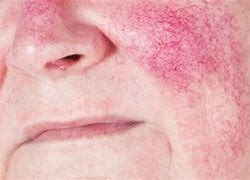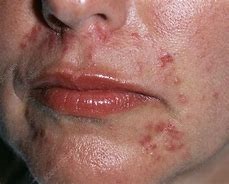Redness

From a sunburn to an allergic reaction, there are many things that can cause your skin to become red or irritated. It may be because extra blood rushes to the skin’s surface to fight off irritants and encourage healing. Your skin can also become red from exertion, such as after a heart-pounding exercise session.
It’s not always a reason for concern, but skin redness can be irritating, uncomfortable and not desired cosmetically. It might also be accompanied by other symptoms. Figuring out its underlying cause can help you treat your skin and keep it from happening again.
Prior to embarking on your skin journey, we encourage you to come into the salon for a one on one consult with a skin therapist to determine your skins needs, your concerns and a professional treatment plan and homecare for you.
Broken Capillaries
Clusters of tiny red veins dotting your cheeks or nose. These unnerving little splotches, also known as broken capillaries, are common. And, luckily, they're treatable.
Broken capillaries are tiny blood vessels that are not truly broken but are dilated, making them more noticeable. They typically look like little red (or sometimes purple) irregular lines, causing the skin to have a reddish discoloration or to look blotchy.
Broken capillaries are most commonly found around the nose or on the cheeks.

Acne & Redness
Acne along with acne you most likely have redness. The redness is inflammation lower in the hair follicle near the oil gland due to bacteria. We can treat both acne and the redness using our Dermalux LED Triwave medical device or combine LED with our Acne Free program. Both treat the bacteria on the surface of the skin and the inflammation underneath the skin enabling the skin to gain strength and balance for the future. If the acne has been treated you may be left with reddish discolouration of the skin – potential scarring. While the area is pink it is able to be treated utilising LED.
Rosacea
Rosacea is a common skin condition that causes redness, flushing, and sometimes pimples and pustules on the face. It’s not the same as acne, but it can make you feel embarrassed or lose confidence, particularly if it is left untreated.
Rosacea isn’t contagious but there is some evidence that it may be hereditary. There’s no cure for rosacea, but there are treatments available that can help control it.
You may have rosacea if you have:
- frequent blushing, flushing or redness on your cheek, nose, chin or forehead
- persistent redness that looks similar to a sunburn that does not go away
- small visible blood vessels on the face
- bumps or pimples on the face that might sting or burn (most often on the cheeks, chin and nose)
Many people with rosacea find that certain factors can trigger their symptoms, such as sun exposure, stress, hot weather, alcohol, hot, spicy foods, exercise, hot baths, or certain medicines or skin care products. You may try keeping a diary to help identify what triggers your symptoms. Then you’ll know what to try to avoid.

Laser treatment may be suggested to treat redness or visible blood vessels. We suggest that you use non-irritating skin-care products, wash your face gently and use sunscreen with an SPF of 15 or more to minimise skin irritation. You should only use oil-free products on your face, never use steroid creams, and try to keep your face cool to reduce flushing.
General redness
This can be from sensitivity. Products, environment, allergy, or food can all create sensitivities. Coming into the salon for a skin consultation will be best to determine your skins needs and help you to look deeper into what the cause might be.
Suggested Products
Each skin is individual in its needs and concerns. The products listed are suggestions and generally best suited to help with your skin concern. Your skin concerns are not limited to these products suggested. Skinfit recommends a skin consultation or front counter skin consultation to have a discussion with a skin specialist to create a customised skin prescription for you to optimise your skincare products and receive the best skin results.






